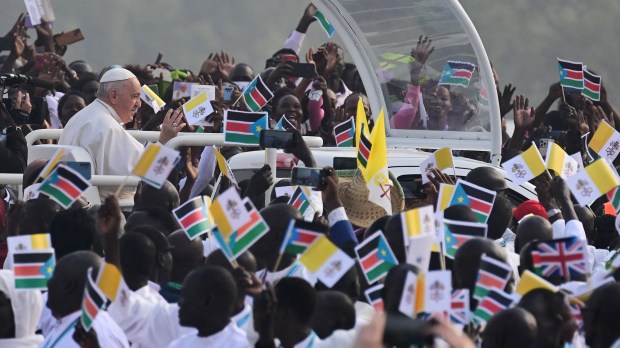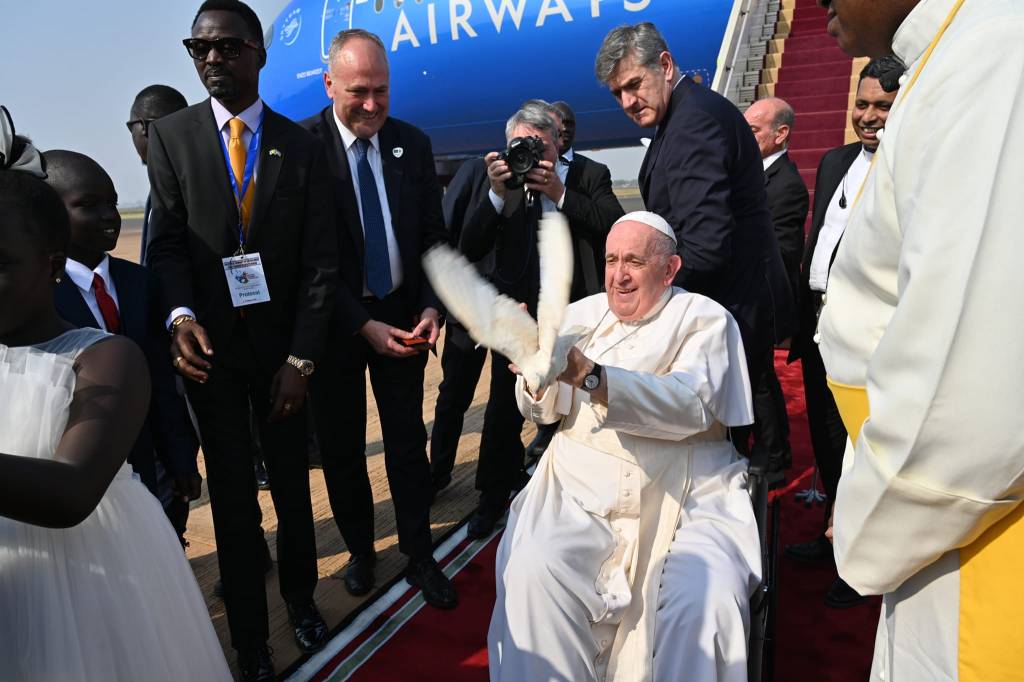Pope Francis visited South Sudan from February 3 to 5, after spending some days in the Democratic Republic of the Congo. For the second leg of his 40th papal trip, the Pontiff was joined by the Archbishop of Canterbury, Justin Welby, and the Moderator of the Church of Scotland, Iain Greenshields, on this unique pilgrimage to promote peace in a Christian country marked by violence and conflict.
Aleteia offers this round-up of the Pope’s main events and statements in Juba.
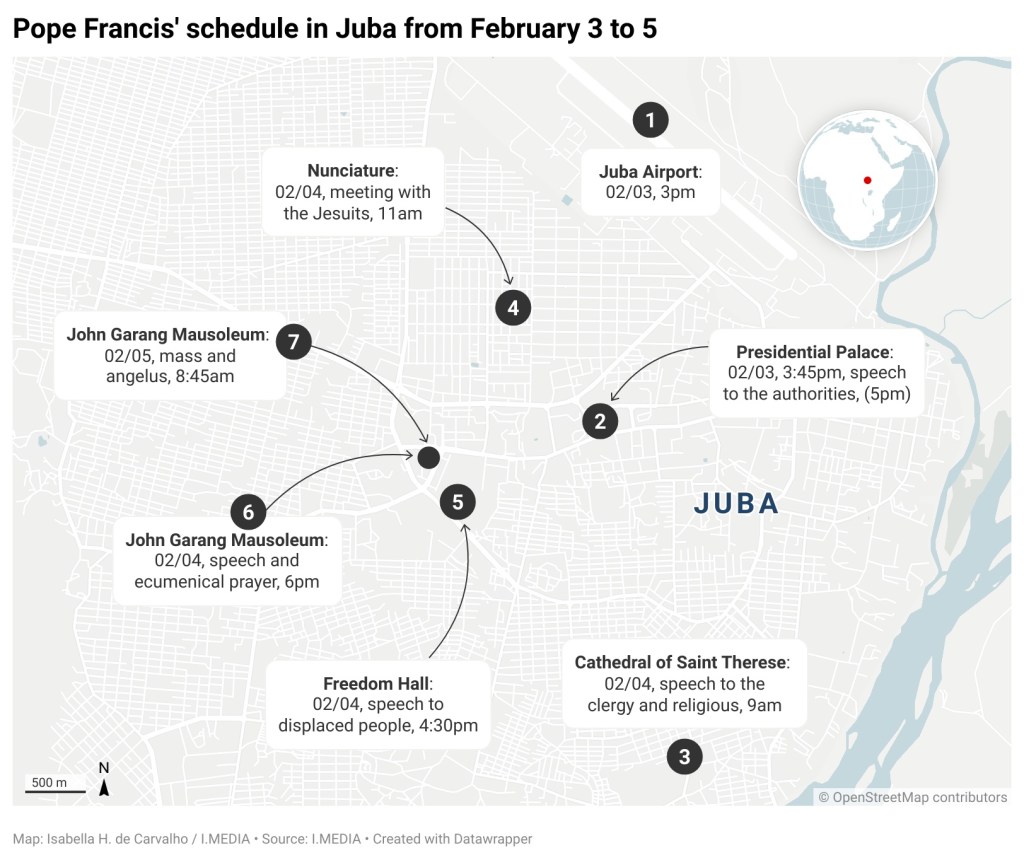
1The beginning of the first ecumenical pilgrimage
As soon as the Pope’s plane landed in Juba on Friday, February 3, the Archbishop of Canterbury and the Moderator of the Church of Scotland, came aboard to greet him. They then descended together and were met by the South Sudanese President, Salva Kiir, who has led the country since its independence in 2011. Pope Francis released a dove after getting off the plane, as a symbol of peace.
In 2019 the Pope, the Archbishop, and the Moderator had invited the South Sudanese leaders for a spiritual retreat in the Vatican to help them through this peace and reconciliation process.
To read Aleteia’s article on why the Pontiff went to South Sudan click here.
2“Future generations will either venerate your names or cancel their memory”
The Pope’s first stop on Friday afternoon was at the Presidential Palace where he had a private meeting with the President. He was then joined by the other religious leaders and the vice-presidents of South Sudan for a short meeting. After these exchanges, and with a serious expression on his face, the Pope went out into the gardens and gave a stern speech to the country’s authority and diplomats. The Archbishop and Moderator also spoke.
“Future generations will either venerate your names or cancel their memory, based on what you now do,” the Pope warned. After decades of conflict which resulted in South Sudan gaining its independence in 2011, the country erupted again in a civil war from 2013 to 2018 resulting in 400,000 deaths and 4 million displaced people (about a third of the whole population). Today it still finds itself in a fragile condition with sporadic violence between armed groups and a vulnerable economic situation.
“No more bloodshed, no more conflicts, no more violence and mutual recriminations about who is responsible for it, no more leaving your people athirst for peace,” the Pontiff said. He recalled the meaning of the word “Republic,” emphasizing that “the state belongs to everyone.”
3A young boy’s incredible gesture
The following morning on February 4, Pope Francis gave a speech to the bishops, priests, deacons, consecrated men and women and seminarians of South Sudan, at St. Theresa’s Cathedral in Juba. He encouraged them to be “a Church that is willing to dirty its hands for people.”
Read Aleteia’s article on the meeting here.
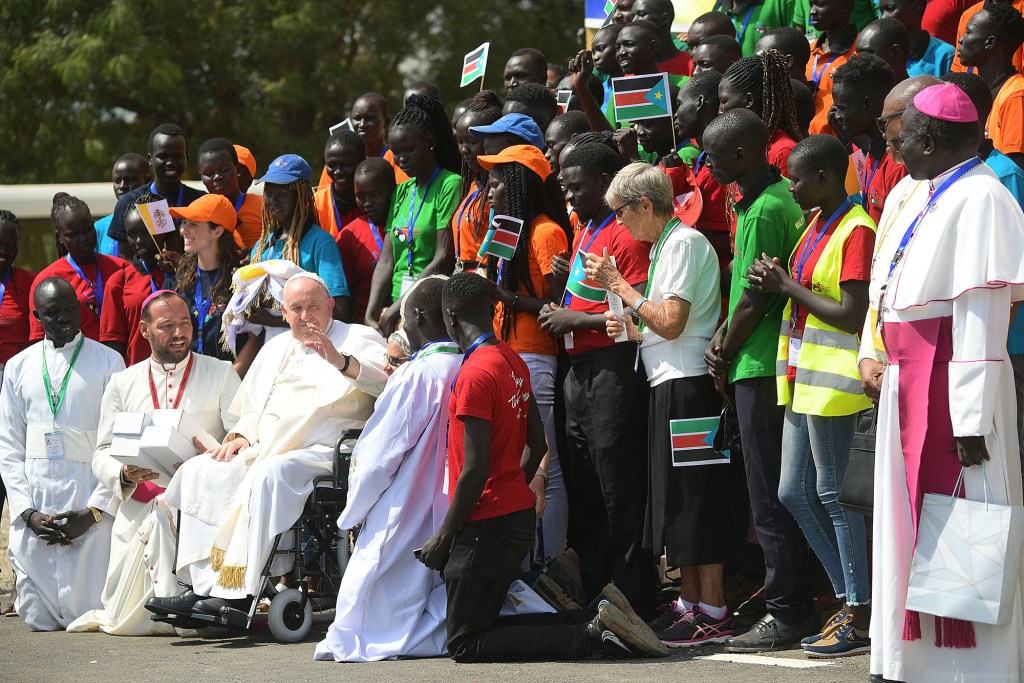
As Pope Francis was leaving the Cathedral a photographer captured an incredibly touching moment. A young boy offered Pope Francis a banknote, recalling the parable of the poor widow who, with her two small coins, gives all she has as an offering.
Read Aleteia’s article here.
4Another private meeting with the Jesuits
Later that morning Pope Francis met privately with the Jesuits in South Sudan, similarly to how he had done in the DRC. This practice of meeting with the members of his own spiritual family has become a tradition during his travels abroad. These exchanges are usually published a few weeks later in the Italian Jesuit magazine La Civiltà Cattolica.
5The struggles of internally displaced people.
In the middle of the afternoon on February 4, Pope Francis met with a group of internally displaced people (IDPs) from several camps across the country. In Juba’s Freedom Hall, the United Nations’ South Sudan representative, Sara Beysolow Nyanti, explained the dire reality that these people face due to conflicts still affecting the country.
“Why are we suffering in the IDP Camp?” asked Joseph Lat Gatmai, a 16-year-old boy from Camp Bentiu, who has been living there since he was 8.
“Thank you for being a great messenger of God. We will never forget this day. Pope Francis, we love you. Thank you for loving South Sudan,” said Nyakuor Rebecca, from Camp Juba.
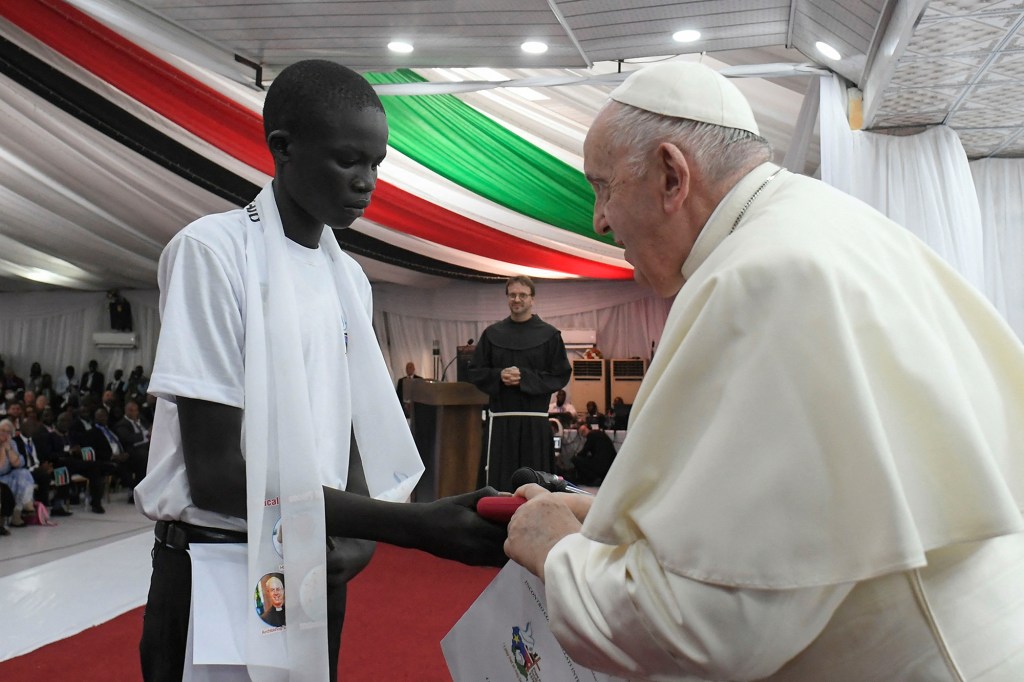
“I want to renew my forceful and heartfelt appeal to end all conflict and to resume the peace process in a serious way, so that violence can end and people can return to living in dignity,” Pope Francis said in his speech. He also emphasized that women are the “key to transforming the country,” as long as they are “protected, respected, valued and honored.”
The Archbishop of Canterbury and Moderator of the Church of Scotland were also present and gave speeches.
Read Aleteia’s interview with Father Bassano, a priest serving in an IDP camp, here.
6A strong moment of Christian unity
For the last event of the day, Pope Francis, Archbishop Welby and Reverend Greenshields participated in an ecumenical prayer for peace in South Sudan. The event was held at the John Garang Mausoleum, the burial site of an important figure in the South Sudanese independence movement.
“’That you love one another as I have loved you’ (Jn 15:12): that is Jesus’ commandment, and it contradicts every “tribal” understanding of religion. “That they may all be one” (Jn 17:21),” Pope Francis underlined in his speech, as dusk was falling on Juba. The Archbishop and the Moderator both spoke before the Pontiff. Echoing the Pope’s words in the meeting with the IDPs, Archbishop Welby also called strongly for the defense and support of South Sudanese women.
Then the three Christian leaders prayed together for peace and blessed the crowd before them in a strong and unique moment of unity.
Read Aleteia’s interview with the Moderator of the Church of Scotland here.
Read Aleteia’s interview with an American missionary in South Sudan on what Christian unity can look like in the country, here.
7“Lay down the weapons of hatred and revenge”
Nearly 70,000 faithful came to the Pope’s last event in South Sudan: a mass held on Sunday, February 5. As Juba’s sweltering heat hung over the John Garang Mausoleum, the crowd waited excitedly for Pope Francis.
“The Pope came to save us from the walls we have built,” said Poni Pamela Benjamin, a mother of 3, who had spent the night in the area to be sure to get a spot for the mass. She also felt touched by the Pontiff’s words encouraging women. “We face a lot of abuses … It is important that the men present hear what the Pope said,” she said.
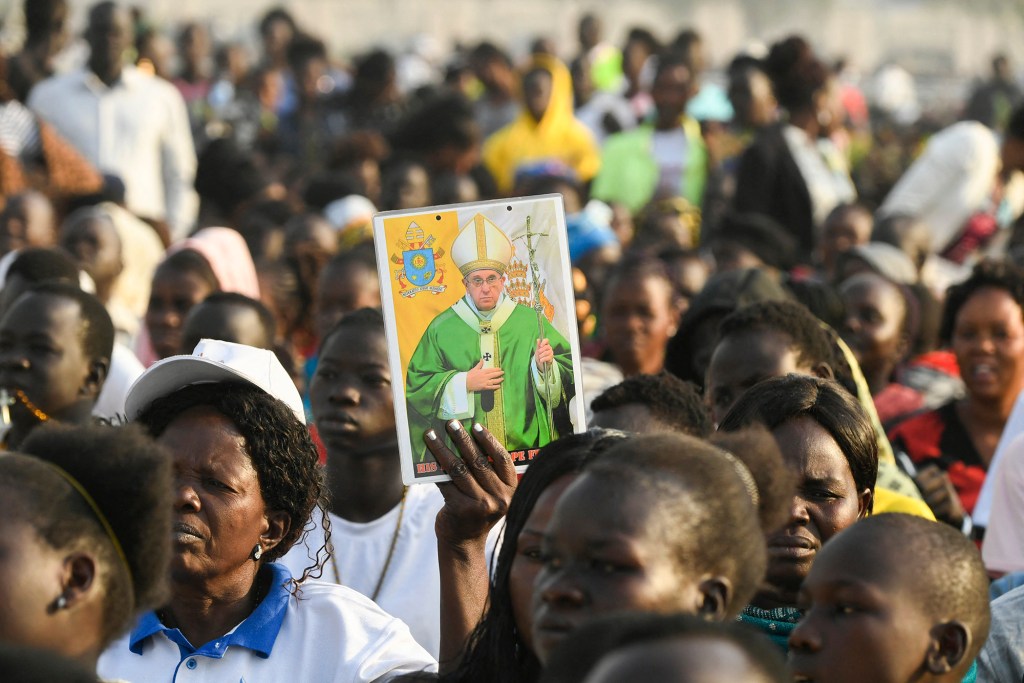
“In the name of Jesus and of his Beatitudes, let us lay down the weapons of hatred and revenge, in order to take up those of prayer and charity,” the Pope said in his homily as a last call for peace and reconciliation in South Sudan. “This country, so beautiful yet ravaged by violence, needs the light that each one of you has, or better, the light that each one of you is.”
In his final remarks, the Pope then decided to entrust “this path of reconciliation and peace to another woman,” the Virgin Mary. “We pray to her now, and we entrust to her the cause of peace in South Sudan and in the entire African continent.”
8A visit to Mongolia coming soon?
Pope Francis’ plane departed from Juba to Rome at 11:56am local time. As is customary, the Pontiff answered questions from journalists aboard the papal flight and this time the Reverend Greenshields and Archbishop Welby also joined him.
The press conference touched on many themes such as Francis’ recent remarks on homosexuality, Pope Benedict XVI, future trips, and especially the exploitation of the African continent. Interestingly, Pope Francis said he is planning to visit Marseille, France, in September, for a meeting of bishops from the Mediterranean, with a possible second leg of the journey featuring a visit to Mongolia in central Asia. He also mentioned a possible visit to India next year and the trip to Lisbon in August for World Youth Day.
